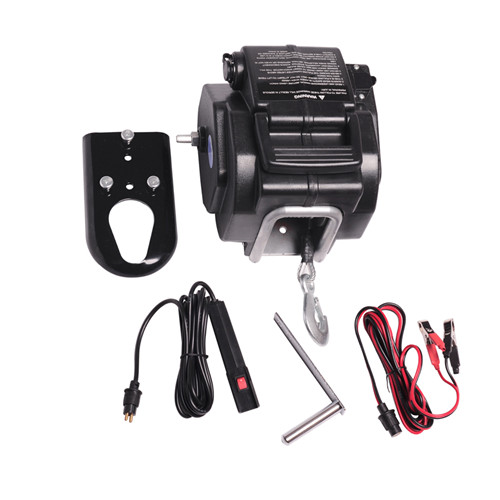Selecting the right boat winch is crucial for ensuring smooth and efficient boat operations. Whether you need to lift an anchor, hoist sails, or pull your boat onto a trailer, having a reliable winch is essential. However, with the wide variety of winches available, it can be challenging to determine which one is best suited for your needs. In this article, we will discuss the key factors to consider when choosing a boat winch, helping you make an informed decision.

One of the most important factors to consider is the winch's load capacity. Assess the weight of the objects you will be lifting or pulling, such as anchors or heavy equipment. Choose a winch that can comfortably handle a load greater than your maximum requirement. This ensures that the winch operates efficiently and safely without the risk of overloading or strain.
Consider the size and weight of your boat. Larger boats generally require more powerful winches to handle their weight effectively. Smaller boats, on the other hand, may not require as robust a winch. Evaluate the specifications of different winches and match them with your boat's size and weight for optimal performance.
There are several types of winches available, including manual, electric, and hydraulic winches. Each type offers its own set of advantages and considerations.
Manual Winches: These Electric winches rely on human power to operate and are suitable for smaller boats or situations where power sources may not be available. Manual winches are cost-effective, easy to maintain, and suitable for lighter loads.
Electric Winches: Powered by electricity, electric winches offer automated operation and are ideal for larger boats or heavier loads. They provide convenience, speed, and remote control functionality. Electric winches require a power source, such as the boat's battery.
Hydraulic Winches: Known for their strength and durability, hydraulic winches utilize hydraulic power for operation. They are commonly used in heavy-duty applications and can handle significant loads. Hydraulic winches require a hydraulic power source and are typically more expensive and require professional installation and maintenance.
Consider the specific needs of your boating activities and select the winch type that aligns with your requirements.
Ensure that the winch you choose is compatible with your boat's design and installation requirements. Consider factors such as mounting options, available space, and any additional hardware needed for installation. Review the manufacturer's instructions or consult a professional if necessary to ensure a proper and secure installation.
Boat winches are exposed to water and harsh marine environments, so it is vital to select a winch that is water-resistant and durable. Look for winches constructed with corrosion-resistant materials and those equipped with appropriate sealing and protective coatings. This will enhance the winch's longevity and reliability, even in challenging conditions.
Prioritize winches that come with safety features designed to protect both you and the equipment. Look for winches with automatic brakes that prevent accidental spooling, load limiters that prevent overloading, and emergency stop mechanisms for immediate halting if necessary. These safety features enhance overall safety during winching operations.
Choosing the right boat winch involves considering factors such as load capacity, boat size and weight, winch type, installation requirements, water resistance, and safety features. By carefully evaluating these factors, you can select a winch that meets your specific needs and ensures efficient and safe boat operations. Remember to consult manufacturer guidelines, seek professional advice when needed, and prioritize durability and reliability to make a well-informed decision. With the right winch factory, you'll be equipped for smooth and successful boating experiences.
Previous: Features and Applications of Segment LCD Modules
Next: Electric Security Fence: Ensuring Safety and Protection
Copyright:@2020-2021
Comments Please sign in or sign up to post.
0
0 of 500 characters used